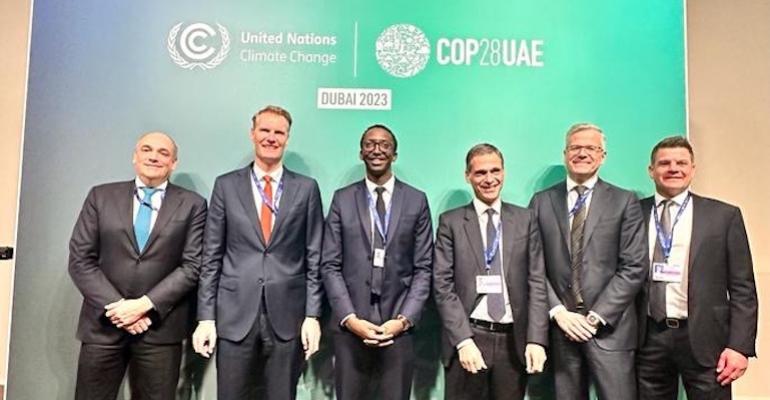In an unprecedented initiative, the chief executives of the five global shipping companies have used the COP28 summit to issue a joint declaration urging the International Maritime Organization (IMO) to create the regulatory conditions necessary to accelerate the transition to green fuels.
The initiative reflects the CEOs belief that shipping must meet the IMO’s 2030, 2040, and net-zero 2050 targets. The only realistic way to meet those targets for an industry that accounts for 2-3% of global greenhouse gas (GHG) emissions is to transition from fossil to green fuels at scale and at pace, the executives said in a statement.
They are convinced that even closer collaboration with IMO regulators will produce the effective and concrete policy measures needed to underpin the necessary investment required both in shipping and ancillary industries.
The joint declaration calls for four regulatory ‘cornerstones’:
- An end date for newbuilding of fossil fuel-only vessels and a clear GHG Intensity Standard timeline to inspire investment confidence, both for new ships and the fuel supply infrastructure needed to accelerate the energy transition;
- An effective GHG pricing mechanism to make green fuel competitive with black fuel during the transition phase when both are used. This can be done by distributing the premium for the green fuels across all the fossil fuel used. With low initial volumes of green fuels, any inflationary effects are minimised. The mechanism must also feature an increasing regulatory incentive to achieve deeper emissions reductions. Furthermore, beyond covering the ‘green balance fee’, revenue generated by the mechanism should go to a research, development and demonstration (RD&D) fund and to investments in developing countries to ensure a just transition that leaves no one behind;
- A vessel pooling option for GHG regulatory compliance where the performance of a group of vessels could count instead of only that of individual ships, ensuring investments are made where they achieve the greatest GHG reduction and thereby accelerating decarbonisation across the global fleet;
- A well-to-wake or lifecycle GHG regulatory basis to align investment decisions with climate interests and mitigate the risk of stranded assets.
“We believe that a regulatory framework and clear targets are crucial to accelerating the introduction of alternative fuels and reducing our carbon footprint,” said Rolf Habben Jansen, CEO of Hapag Lloyd.
“The support of Governments across the world will be an essential element to reach our common goal [of net zero by 2025] and among those efforts we want to see an end to delivery of ships that can only run on fossil fuels,” said Soren Toft, Chief Executive Officer of MSC.
The move will add to pressure on the IMO to strengthen its decarbonisation targets. However, the consensus-based UN agency has members with widely varying interests.
But the CEOs’ COP28 initiative demonstrates the shared conviction that regulation can play a key role in mitigating the cost of the green transition. Given that the cost of climate change is far greater than the transition, the leading executives are hoping to be joined by those from other companies.
Copyright © 2024. All rights reserved. Seatrade, a trading name of Informa Markets (UK) Limited.
Add Seatrade Maritime News to your Google News feed.  |

